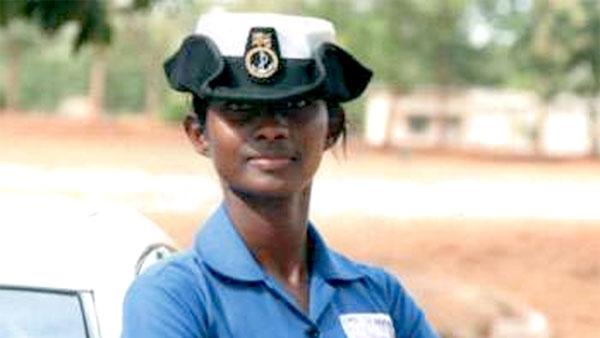
For 21-year-old Ayesha Sewwandi, military service was more than just an occupation - it was a family affair. Her father was in the Sri Lanka Army and sister and two brothers (all elder to her) are also attached to the armed forces.
 Her dream came true when she was absorbed into the Sri Lanka Navy (SLN), but it was a short lived one. Her expectations in life were cut short when she took her life last Friday (15) at her house in Mahawila, Uragasmanhandiya, during a ten-day vacation. Leaving a letter addressed to her family, she cited harassment by a senior female officer at the camp-SLNS Dakshina in Galle- where Sewwandi, was serving.
Her dream came true when she was absorbed into the Sri Lanka Navy (SLN), but it was a short lived one. Her expectations in life were cut short when she took her life last Friday (15) at her house in Mahawila, Uragasmanhandiya, during a ten-day vacation. Leaving a letter addressed to her family, she cited harassment by a senior female officer at the camp-SLNS Dakshina in Galle- where Sewwandi, was serving.
Despite her confession, Navy Spokesperson Lieutenant Commander Isuru Suriyabandara said it was hard to determine the reason for the Navy officer’s demise without an understanding of the events. “Suicides are seen in many places not just in the Forces,” he said.
Inquiries
The SLN is carrying out an inquiry and the Uragasmanhandiya police is conducting a separate investigation.
Uragasmanhandiya police OIC Vijith Jayantha said that their investigation has thus far not proven any form of harassment by the said senior female officer.
However, Sewwandi’s mother said her daughter complained that she was being harassed at the camp several times before Friday’s incident. Why couldn’t Sewwandi speak about her plight to a responsible officer?According to a spokesperson of the Centre for Women’s Research (CENWOR), a non-profit organisation, Sri Lanka’s armed forces and police lack a policy for reporting workplace harassment. “As a result women are left to suffer in silence,” she said.
She said that the country lacks a serious study into workplace harassment and gender discrimination in the Security Forces. She said it would be ideal if the forces initiate a study of this nature as it will show they recognise their responsibility towards female officers and also enable them to adopt corrective action.
Harassment
Harassment in such institutions are seldom reported or made public due to the strict policies of the military.
The Secretary of the Janasandanaya (Peoples Forum, an organisation which was initiated in 1993 to protect and promote human rights), Chithral Perera said workplace harassment, especially, towards women is a common occurrence in state institutions, but the situation is much grimmer in the military and police, both male dominant organisations.
“We got to know about a case where a low ranking female officer was sexually harassed by her commanding officer in the Sri Lanka Army (SLA). When she complained to fellow-officers they simply told her to ‘go with it’ or leave because if she complained her work life will be miserable,” Perera said.
She pursued her complaint, but no official action was taken by the army. As predicted by her colleagues, her work life became unbearable. She was not given services, such as transport when she needed to go somewhere. The female officer later gave up fighting for justice.
Perera drew attention to a video that went viral in 2014, which depicted female recruits being humiliated, harassed and assaulted with sticks by male and female soldiers.
The incident had taken place in a training camp in Anuradhapura in 2012. The rigorous training session did not abide by the standard procedures.
“All that happened after the expose was the military launching an investigation to see how the video was released. That is how these cases are kept hidden away society,” Perera said.
The Sunday Observer learnt of a separate case involving a female police officer. This is how her story unfolds: the Woman Police Constable was deployed to Southern Sudan and in 2016, she faced quid pro quo sexual harassment from a senior Sri Lankan Assistant Superintendent of Police (ASP) there. She constantly faced suggestions of a sexual nature and was often verbally abused when she did not act in a positive manner to the suggestions by the ASP.
The abuse had continued during her tenure. Thereafter, she decided to complain to the United Nations regarding his behaviour.
The UN conducted an inquiry into the allegations, even visiting Sri Lanka as part of their investigation. He was found guilty and blacklisted by the UN preventing him from future deployment in UN Missions. However, she received a different response from the police. On her return, while she lodged a complaint, the Police did not conduct an inquiry nor take any action against the officer.
Systems
Navy Spokesperson Lieutenant Commander Suriyabandara said there is a mechanism to report harassment in the military.
“We have a system called the Divisional System. This divisional system is taught to all the officers at the orientation program at the beginning and throughout. The purpose of this is nothing but to manage issues in officer management. According to the Divisional System, they are advised about actions they should take in a situation like this,” he said referring to Sewwandi’s case.
If this fails, there is another system to be followed. “For instance, an officer who faces such problems can complain to the President. And a marine officer can go up to the level of the Navy Commander”.
It is an obligation of all Navy officers to adhere to this system. The principle aim of introducing such a mechanism is also to uphold good practices.
SLA Spokesperson Brigadier Sumith Atapattu said the same procedure is followed in the Army and the Air force.
Additional reporting by Sirangika Lokukarawila
